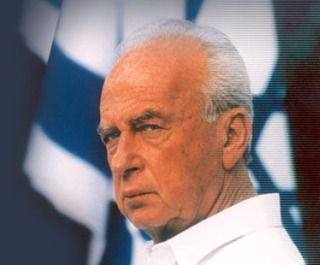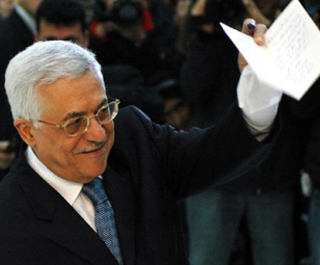Blog: October 2009 Archives
In this video, my colleague Lara Friedman discusses the challenges and opportunities President Barack Obama faces in pursuing peace for Israel.
 American baby-boomers will always remember where they were when President Kennedy was assassinated.
American baby-boomers will always remember where they were when President Kennedy was assassinated.
Israelis, who today are marking the 14th anniversary of Prime Minister Yitzhak Rabin's assassination, will always remember where they were when Rabin was murdered by an Israeli religious-nationalist Jew, determined to undermine the peace efforts of Rabin's government.
Whose Israel is It?
By Jo-Ann Mort - October 25, 2009,
I have spent the day in Washington, first at the Americans for Peace Now board meeting, where I am an officer, and later at the J Street conference, where I am a participant. I go to sleep tonight with this sentiment dancing on my brain: the promise of Israel needs to be embraced and supported, promoted and defended--fought for. That is not the case presently in much of American political discourse.
 Palestinian President Mahmoud Abbas set January 24, 2010 as the date for new elections for both the presidency and the legislature of the Palestinian Authority.
Palestinian President Mahmoud Abbas set January 24, 2010 as the date for new elections for both the presidency and the legislature of the Palestinian Authority. Monday's Middle East Peace Report took a look at recent polls of the Palestinian public.
The Israeli-Palestinian conflict has innumerable costs. One of them is the psychological stress on Israeli society, which is gradually becoming more violent and more brutal.
And what does Ben-David attack Rebecca for? Being of Arab descent and working for organizations that explicitly, publicly support Israeli-Palestinian peace and the two-state solution. Outrageous. Intolerable. I spent a good part of the day fuming. And then I read Spencer Ackerman's response, and I felt a lot better. I recommend it to all.
Israel's deputy prime minister, Dan Meridor, spoke over the weekend in Washington about what he sees as the three chief foreign policy challenges that Israel faces today: Iran, the Israeli-Palestinian peace process and the Goldstone report.
Ha'aretz: "Hilltop Double-talk"
While Prime Minister Benjamin Netanyahu tries to battle the Goldstone report in the name of Israel's right to self-defense, and his envoys and the U.S. administration discuss terms for renewing negotiations with the Palestinians, his government is developing infrastructure in dozens of West Bank settlements.
The second day of discussions at the Washington Institute for Near East Policy's annual conference ended with winds of war.
America woke up today to a pleasant surprise: President Barack Obama is the winner of the Nobel Peace Prize.
I rushed the following quote to the news wires: "President Obama deserves recognition and praise for making Middle East peace a top U.S. foreign policy priority from his first moments in the Oval Office. We hope that winning the prestigious prize will further energize the President and his aides to push for peace between Israel and her neighbors."
JTA, the Jewish news service, noted that "The first pro-Israel group to praise Obama was Americans for Peace Now."
And what Obama officials were saying about the sanctions -- including alluding to concerns that they would harm civilians rather than the government and could thus be counterproductive, and emphasizing the need for multilateral, rather than unilateral, action -- would seem to indicate that they share many of our concerns about this particular sanctions initiative.
Key excerpts from the hearing are copied here:
Special analysis from Daniel Seidemann (Ir Amim) and Lara Friedman (Americans for Peace Now)
The recent violence on the Temple Mount/Haram al Sharif is only the latest indication of the rising level of tension in Jerusalem - tension that has been steadily increasing for months. The potential for a highly disruptive, violent conflagration in Jerusalem is more likely now than at any point since the visit of then-opposition leader Ariel Sharon to the Temple Mount in September 2000, triggering the worst wave of Israeli-Palestinian violence since 1967. Indeed, as the world is coming to recognize, the current mix of destabilizing factors at play is hauntingly familiar - resembling the period that led to the outbreak of the second Intifada.
As I see it, President Obama's commitment to serious and meaningful engagement with Iran - including potential incentives for nuclear transparency - offers Teheran an opportunity that it did not have under the Bush administration for de-escalating its standoff with the international community.
Obama's statement regarding a constructive beginning of the talks with Iran should further prompt American friends of Israel to support the President's responsible strategy.
That's my view. I welcome your reactions.
Blog Monthly Archives
- January 2014
- December 2013
- November 2013
- October 2013
- September 2013
- August 2013
- July 2013
- June 2013
- May 2013
- April 2013
- March 2013
- February 2013
- January 2013
- December 2012
- November 2012
- October 2012
- September 2012
- August 2012
- July 2012
- June 2012
- May 2012
- April 2012
- March 2012
- February 2012
- January 2012
- December 2011
- November 2011
- October 2011
- September 2011
- August 2011
- July 2011
- June 2011
- May 2011
- April 2011
- March 2011
- February 2011
- January 2011
- December 2010
- November 2010
- October 2010
- September 2010
- August 2010
- July 2010
- June 2010
- May 2010
- April 2010
- March 2010
- February 2010
- January 2010
- December 2009
- November 2009
- October 2009
- September 2009
- August 2009
- July 2009
- June 2009
- May 2009
- April 2009
- March 2009
- February 2009
- January 2009
- December 2008
- November 2008
- October 2008
- September 2008
- August 2008
- July 2008
- June 2008
- May 2008
- April 2008
- March 2008
- February 2008
- January 2008